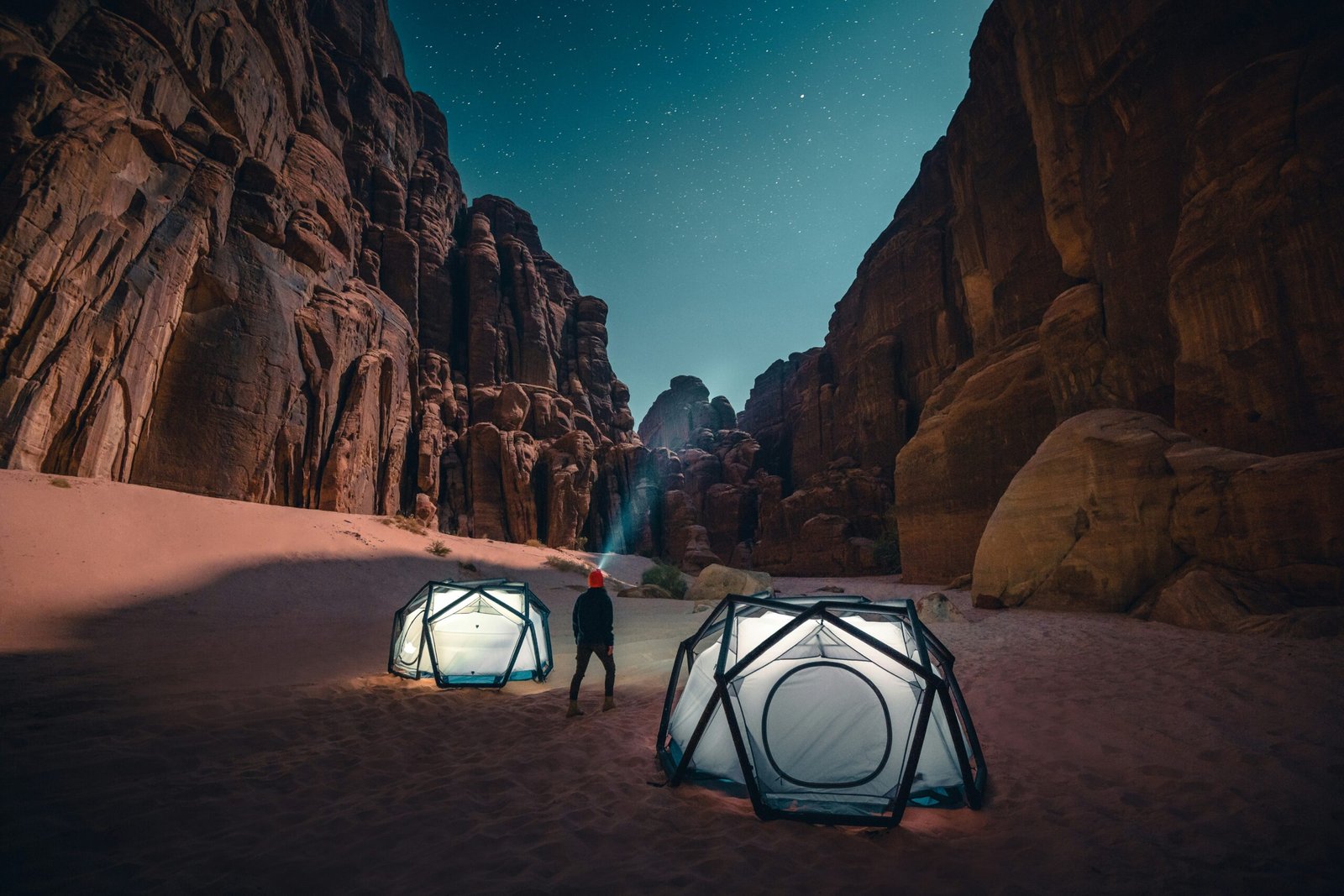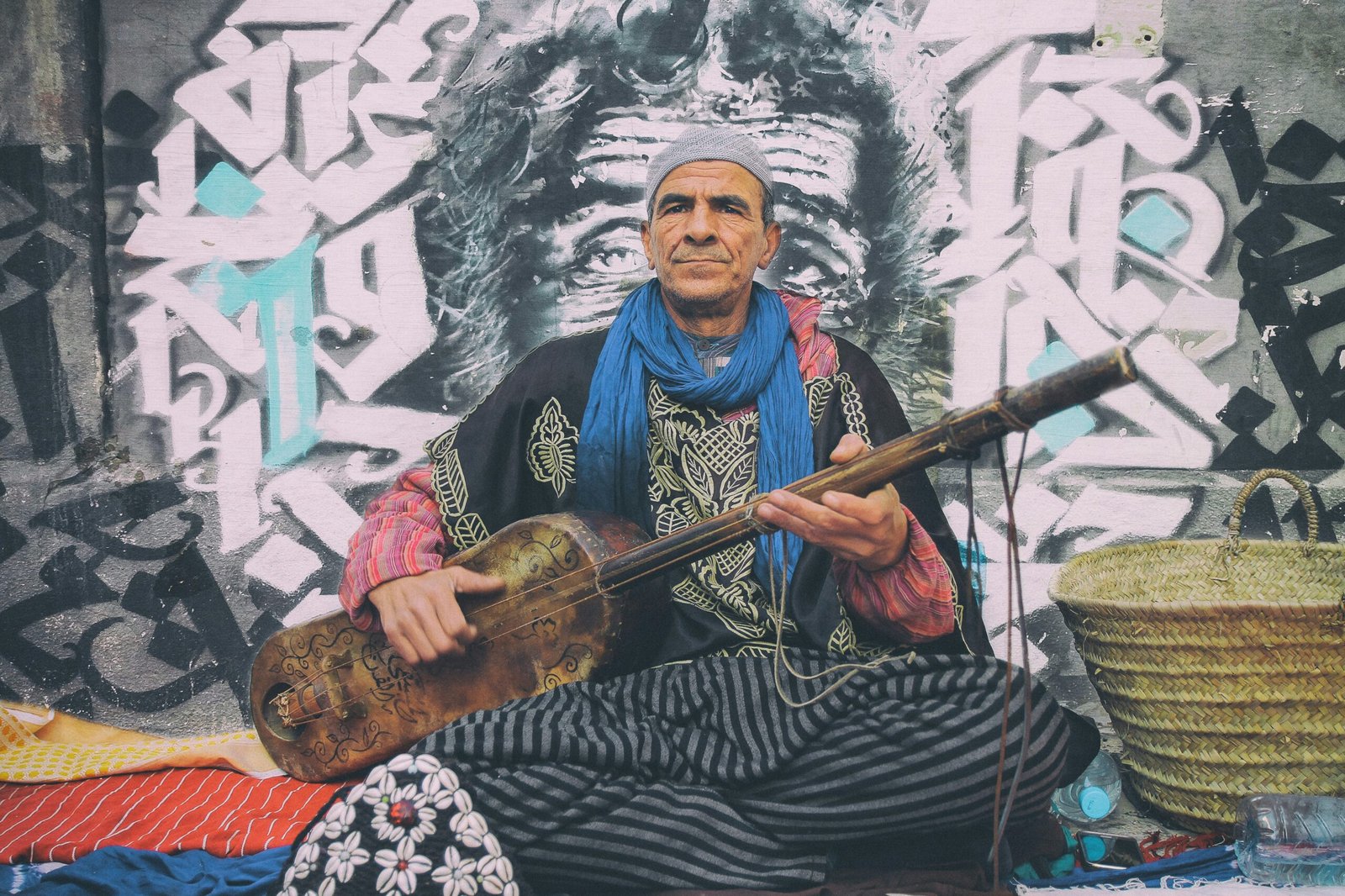
Introduction to Moroccan Accommodations
Morocco, with its rich tapestry of culture and history, offers an array of unique accommodations that reflect the country’s diverse heritage. Travelers seeking an authentic experience can choose from various lodging options, each characterized by its own charm and ambiance. The contrast between traditional riads nestled within the vibrant cities and serene desert camps scattered across the vast Sahara highlights the multifaceted nature of Moroccan hospitality.
Riads, which are traditional Moroccan houses or palaces with interior gardens or courtyards, serve as a hallmark of urban accommodations in cities like Marrakech, Fez, and Essaouira. These enchanting establishments showcase intricate tile work, lush greenery, and ornate decor that provide an inviting atmosphere. A stay in a riad immerses guests in the rich local culture, often incorporating contemporary comforts while maintaining historical integrity. The intimate nature of these lodgings allows for personalized service, ensuring that visitors feel at home amid the bustling streets and vibrant souks.
On the other hand, the desert camps offer a striking contrast, inviting travelers to experience the tranquility of the desert landscape under a canopy of stars. Set against the backdrop of stunning sand dunes, these accommodations provide a unique opportunity to connect with nature and unwind from the fast-paced city life. Guests can engage in various activities such as camel trekking, stargazing, and enjoying traditional Berber music around a fire. Each evening spent in a desert camp reinforces the simplicity and beauty of life in the Sahara, creating lasting memories.
In exploring these diverse accommodations, it becomes evident that Moroccan lodging options are not merely places to stay; they are gateways to experiencing the country’s captivating culture, warm hospitality, and breathtaking landscapes.
The Allure of Riads: A Peek Inside
Riads hold a unique significance in Moroccan culture, representing traditional houses that are often characterized by their inward-facing architecture and serene inner courtyards. These architectural gems are typically adorned with intricate tile work, handcrafted wood carvings, and lush greenery, providing a tranquil escape from the bustling streets of Moroccan cities. The design of a riad maximizes the interior space, allowing guests to enjoy peaceful outdoor areas where they can relax and soak in the local ambiance.
The historical context of riads can be traced back to the Islamic era, serving as familial dwellings and centers of hospitality. Originally, these houses were designed to protect inhabitants from the harsh weather while maintaining privacy from the street. Over time, they have evolved into welcoming accommodations that showcase the rich heritage of Morocco. Staying in a riad offers visitors a genuine experience of Moroccan culture, providing a distinctive alternative to conventional hotels.
A pivotal aspect of the riad experience is the exceptional hospitality typically offered by the owners and staff. Many riads are family-run, allowing for personalized service that enhances the overall stay. Guests are often treated to a warm welcome and are encouraged to engage with their hosts, enabling them to develop a deeper understanding of local customs and traditions. Furthermore, these establishments frequently serve traditional Moroccan cuisine, allowing travelers to savor authentic flavors right within the courtyard of their residence. From fragrant tagines to freshly baked pastries, dining in a riad becomes an intimate experience that reflects the essence of Moroccan culinary practices.
By immersing oneself in the atmosphere of a riad, guests not only find comfortable accommodations but also gain insight into the vibrant tapestry of Moroccan heritage. This unique lodging option presents an enriching journey that resonates with the heart of Morocco.
Experiencing Local Culture in Riads
Staying in a riad in Morocco offers a unique opportunity to immerse oneself in the rich tapestry of local culture. Characterized by their distinctive architecture, riads feature intricate tile work, elaborate wood carvings, and lush courtyards adorned with vibrant plants, creating an inviting oasis that reflects the artistry of Moroccan craftsmanship. These elements are not merely aesthetic; they symbolize the deep-rooted traditions and customs that shape daily life in Morocco.
Many travelers find that their riad experiences go beyond mere accommodation. One visitor shared, “Arriving at our riad felt like stepping into another world. The warm, aromatic scents of mint tea welcomed us, and the lavish decorations spoke to the heart of Moroccan artistry. It was a comforting feeling that made us feel we belonged there.” Indeed, the welcoming nature of riad hosts exemplifies the famed Moroccan hospitality, making guests feel like family rather than mere visitors. This atmosphere encourages interactions with local customs, from enjoying traditional meals prepared with fresh, local ingredients to participating in communal activities that foster connections with other travelers and the community.
The design of riads also often incorporates symbols and motifs that speak to local culture. For instance, geometric patterns and calligraphy found in many riads reflect the Islamic cultural heritage prevalent in Morocco. Guests are frequently captivated by these details, resulting in a deeper understanding and appreciation of the cultural significance behind them. Additionally, personal anecdotes from visitors often highlight how their time in riads led to memorable experiences, such as lively conversations with local artisans or participation in traditional cooking classes. Through these interactions, travelers not only gain insights into Moroccan culture but often return home transformed, carrying with them the warmth and vibrancy of their riad experience.
Desert Camps: An Escape to Nature
The Moroccan Sahara is renowned for its vast, mesmerizing landscapes, making it an ideal location for those seeking an authentic desert experience. Staying in a desert camp allows travelers to immerse themselves in the serene beauty of the dunes, where the tranquil atmosphere and breathtaking night skies create an unforgettable escape into nature. The allure of spending a night beneath a star-studded sky, surrounded by golden sand dunes, is a unique experience that cannot be replicated elsewhere.
Desert camps come in various forms, ranging from luxurious tents adorned with intricate traditional décor to more rustic accommodations that promise an authentic camping experience. These camps often feature spacious tents equipped with comfortable bedding, private bathrooms, and essential amenities, ensuring guests can enjoy a peaceful and restful night amidst the wilderness. Many desert camps also offer communal dining areas where guests can indulge in delicious Moroccan cuisine, enriched with local spices and flavors, further enhancing their stay.
Services at desert camps typically include guided tours into the desert, providing guests with the opportunity to explore the striking landscapes by camel or 4×4 excursions. These guided experiences allow visitors to connect with nature and learn about the unique ecology and culture of the region. In addition, many camps host traditional evening entertainment, such as live music and storytelling, which enrich the overall experience and create a sense of community among guests.
The desert atmosphere, characterized by its calming silence and stunning vistas, fosters a deep connection to nature. It is an inviting retreat from the hustle and bustle of everyday life, allowing visitors to reflect and rejuvenate as they breathe in the fresh, unpolluted air. For those seeking a distinctive experience in Morocco, staying in a desert camp is a remarkable escape that leaves lasting memories.
Activities and Adventures at Desert Camps
Desert camps in Morocco offer an array of unique activities and adventures that allow visitors to immerse themselves in the enchanting landscape of the Sahara and the vibrant culture of the Berber people. One of the most popular experiences is camel trekking. Guests can embark on guided camel rides that traverse the stunning dunes, offering an exhilarating way to explore the diverse terrain. These treks can range from a short ride to a multi-day journey, allowing participants to connect with the rhythm of the desert while learning about the nomadic lifestyle of the Berber communities.
In addition to camel trekking, desert camps often organize dune excursions. These excursions can include exhilarating activities such as sandboarding down steep dunes or quad biking for those looking for a more adrenaline-filled experience. As visitors navigate the shifting sands, they will be captivated by the sheer beauty of the desert at different times of the day, particularly during sunrise and sunset when the colors dramatically transform.
Another highlight of staying in a desert camp is stargazing. Unlike urban areas, the Sahara’s remote location provides an unrivaled view of the night sky. Many camps offer guided stargazing sessions where visitors can learn about constellations and celestial bodies while enjoying the serene surroundings. This immersive experience fosters a sense of tranquility and connection to nature, allowing guests to reflect on the vastness of the universe.
Additionally, cultural performances are integral to the experience at desert camps. Guests can enjoy traditional music, dance, and storytelling performed by local Berber tribes, enriching their understanding of the region’s heritage. These performances not only provide entertainment but also serve as a bridge between cultures, creating memorable interactions for travelers. Overall, the activities available at desert camps enable guests to engage deeply with both the breathtaking desert landscape and the rich Berber culture, encapsulating the thrill of adventure in one of the world’s most mesmerizing environments.
Comparing Riads and Desert Camps: Which to Choose?
When considering a stay in Morocco, travelers often find themselves choosing between the vibrant atmosphere of a riad or the serene isolation of a desert camp. Understanding the fundamental differences between these two unique accommodations can significantly influence the overall travel experience. Each option provides distinct atmospheres, activities, and cultural insights that appeal to different types of travelers.
Riads, traditional Moroccan houses built around a central courtyard, offer a glimpse into Morocco’s rich cultural heritage. Typically located in the bustling medinas of cities like Marrakech and Fes, riads provide easy access to local markets, historical sites, and lively street life. Travelers seeking an immersive urban experience, combining comfort with cultural exploration, will often find riads to be the perfect choice. The intricate architecture and tranquil courtyards create an inviting atmosphere, making riads particularly suitable for those who wish to relax after a day of sightseeing.
In contrast, desert camps offer an entirely different experience, set against the backdrop of sweeping sand dunes and expansive skies. These camps, often situated in places like the Erg Chebbi and Erg Chigaga, cater to adventurous travelers eager to explore the Moroccan desert landscape. They provide opportunities for activities such as camel trekking, stargazing, and experiencing nomadic culture. Desert camps are best suited for those seeking tranquility, adventure, and a break from the hustle of urban life. The serene environment encourages relaxation and reflection, making it an ideal escape for nature lovers or those in search of a unique experience.
Ultimately, travelers interested in a well-rounded journey through Morocco may benefit from blending both experiences. Spending time in a riad can provide an understanding of urban culture, while a stay in a desert camp allows for exploration of the vast, stunning landscapes the country has to offer. Whether opting for the comfort of a riad or the adventure of a desert camp, travelers are bound to create unforgettable memories in this enchanting destination.
Tips for Booking Unique Accommodations
When planning a trip to Morocco, finding unique accommodations, such as traditional riads or enchanting desert camps, can greatly enhance your travel experience. To begin, consider utilizing reputable travel websites and platforms like Booking.com, Airbnb, and TripAdvisor, recognized for their customer reviews and comprehensive listings. Alternatively, local agencies can provide tailored options and insights that align with your preferences and budget.
Another effective strategy is to ensure you are booking directly with property owners where possible. This method often allows for more personalized service and the potential for exclusive deals. Look for properties that prioritize guest satisfaction, evident in their reviews and feedback. Pay attention to the responsiveness of hosts, as this can be indicative of the level of service you can expect during your stay.
In terms of amenities and services, evaluate what each accommodation offers. A unique riad may provide traditional Moroccan breakfasts and guided tours, while a desert camp might include camel trekking experiences and stargazing sessions. Determine which features are most important for your comfort and enjoyment. Additionally, check if the accommodation has safety measures in place, such as secure entrances, smoke detectors, and emergency protocols, to ensure a safe environment throughout your stay.
Moreover, be mindful of the cancellation policies and payment options available. Flexible terms can provide peace of mind should your travel plans change unexpectedly. Finally, once you identify a suitable unique accommodation, book well in advance, especially during peak tourist seasons, to guarantee availability and potentially secure better rates. Planning ahead facilitates a seamless experience, allowing you to fully immerse yourself in the rich culture and stunning landscapes of Morocco.
Cultural Etiquette and Expectations
When traveling to Morocco, understanding and respecting local cultural etiquette is crucial for fostering positive interactions and ensuring an enjoyable experience. This is particularly important when staying in unique accommodations such as riads and desert camps, where guests are often immersed in traditional lifestyles.
One of the fundamental aspects of Moroccan culture is the significance of dress. While Western clothing is generally accepted, it is advisable for travelers to wear modest attire, especially in rural areas or when visiting religious sites. Women are encouraged to wear long skirts or pants and cover their shoulders. Men should also dress conservatively, avoiding shorts and sleeveless shirts in more traditional settings. By adhering to these dress codes, visitors demonstrate respect for local customs and norms.
Meal customs in Morocco are another area where cultural understanding can enrich the travel experience. Food symbolizes hospitality, and meals are often enjoyed communally. It is common to partake in meals using one’s right hand, as the left hand is considered impolite for eating. Travelers should wait for the host to begin eating before joining in, as this is a sign of respect. Additionally, savoring the food and complimenting the host can enhance social bonds within these cultural interactions.
Respectful interaction with locals can significantly influence a visitor’s experience. Greetings in Morocco typically involve a handshake, although more personal gestures may be reserved for close acquaintances. It is important to maintain a friendly demeanor and to engage in polite conversation, asking about local customs can be a good way to show genuine interest and appreciation for the culture. Understanding these basic expectations can create a more authentic and enriching experience during stays in both riads and desert camps.
Conclusion
Staying in Morocco offers travelers an array of unique experiences that seamlessly blend the country’s rich culture and stunning landscapes. From the enchanting riads nestled within the bustling medinas to the serene desert camps located amidst the vast, rolling dunes, each accommodation provides travelers with a distinctive way to immerse themselves in Moroccan life. Riads, with their intricate architectural designs, often serve as peaceful retreats where one can experience traditional Moroccan hospitality. Guests can enjoy the authentic ambiance, indulging in local cuisine while surrounded by the tranquility of inner courtyards adorned with lush greenery and decorative tiles.
On the other hand, desert camps present a striking contrast to the urban charm of riads. As night falls, the desert unveils a mesmerizing starlit sky, creating an unforgettable backdrop for intimate moments and reflection. The chance to disconnect from the fast-paced world and connect with nature amidst the majestic dunes is a unique opportunity for rejuvenation. Travelers can engage in activities such as camel trekking, sandboarding, or simply basking in the beauty of the ever-changing landscape.
Whether opting for the cultural richness found in a traditional riad or the adventurous spirit fostered by a desert camp, visitors to Morocco are sure to create lasting memories. Embracing both types of accommodations allows for a deeper understanding of the country’s diverse offerings and invites exploration beyond the typical tourist path. This journey through Morocco’s picturesque settings will undoubtedly remain etched in the hearts of those fortunate enough to experience its timeless charm. Therefore, as you plan your travels, consider venturing into these remarkable places that await discovery in Morocco.





